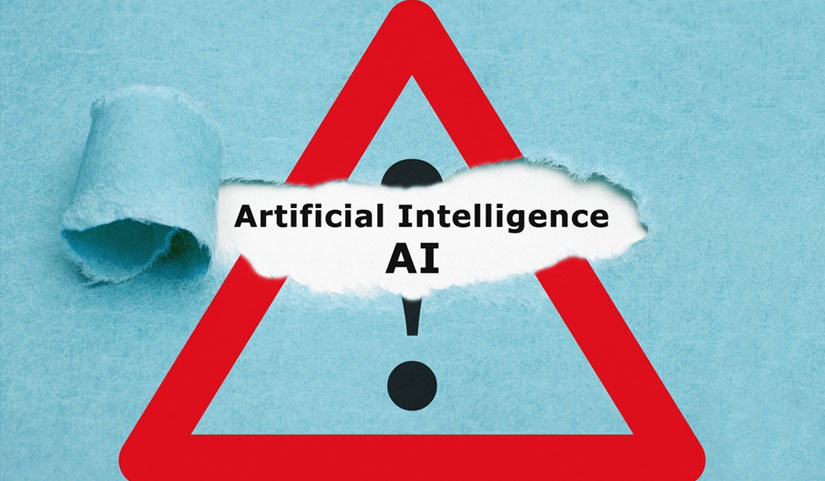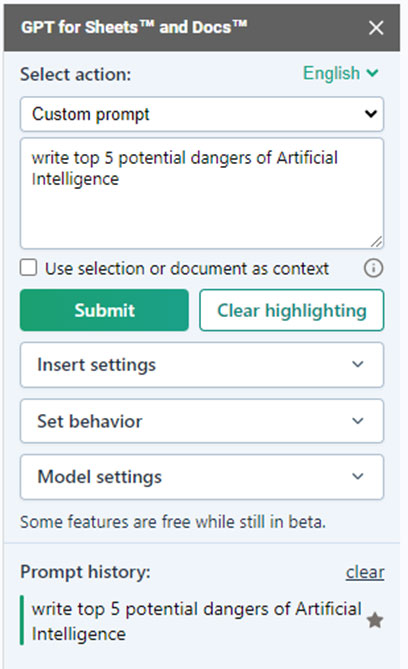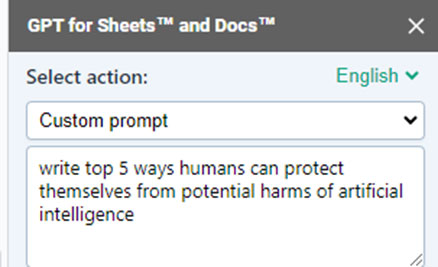Top 5 Potential Risks of Artificial Intelligence

The future is here, and Artificial Intelligence is becoming more prominent in our daily lives whether we like it or not. And, with any new technology, there are always concerns about the unknown–especially when there is so much information out there about the potential of A.I. taking over humanity!
So, we had a thought. What would A.I. say about the potential dangers of A.I.? If you haven’t yet used Chat GPT or any other type of A.I. tool, it is actually quite fascinating to watch coherent information being delivered in real time. We tested out the following command (you don’t even have to ask nicely):

And, voila! Here is what appeared on the word document:
- Unintended Consequences: AI systems are complex and can have unpredictable behaviors. There is a risk of unintended consequences arising from AI decision-making, especially as AI becomes more autonomous. These unintended consequences could range from minor errors to catastrophic failures, potentially causing harm to individuals or even society as a whole. It is important to carefully test and monitor AI systems to minimize these risks.
- Ethical Concerns: AI systems are programmed based on the data they are trained on, which can introduce biases and discrimination. If not carefully managed, AI algorithms could perpetuate existing societal inequalities, reinforce stereotypes, or make decisions that are unfair or discriminatory. Ensuring ethical AI development and deployment is crucial to avoid these potential dangers.
- Privacy and Security Risks: AI systems often require access to vast amounts of personal data to function effectively. This raises concerns about privacy and the potential for misuse or unauthorized access to sensitive information. Additionally, AI-powered cyberattacks could become more sophisticated, posing a significant threat to individuals, organizations, and even national security.
- Job Displacement: As AI technology continues to advance, there is a growing concern that it will replace human workers in various industries. This could lead to widespread unemployment and economic instability, as many jobs become automated, leaving people without livelihoods and struggling to adapt to the changing job market.
- Superintelligence: The development of highly advanced artificial intelligence systems could potentially lead to the creation of superintelligent machines that surpass human intelligence. This could result in machines becoming autonomous and making decisions that may not align with human values or interests, posing a significant danger to humanity.
YIKES! Unless you have faith in a higher being, this information could create a panic epidemic leading to a dystopian nightmare beyond Orwell’s wildest imagination! But take a deep breath and let’s try something else. So, if A.I. can predict potential risks of A.I., perhaps it can also tell us how to protect ourselves from these potential risks.

Well, lo and behold:
- Collaboration and Interdisciplinary Research: Humans should encourage collaboration and interdisciplinary research involving experts from various fields such as computer science, ethics, psychology, and law. By bringing together diverse perspectives, insights, and expertise, humans can develop comprehensive approaches to address the potential harms of AI. This collaboration can lead to the development of robust safety measures, effective governance frameworks, and ethical guidelines for AI systems.
- Education and Awareness: Promoting education and awareness about artificial intelligence is crucial to protect humans from potential harm. It is essential to educate the general public, policymakers, and professionals about the capabilities and limitations of AI systems. This knowledge will enable individuals to make informed decisions and actively participate in shaping AI policies and regulations.
- Continuous Monitoring and Evaluation: Humans need to continually monitor and evaluate the performance and impact of AI systems. This includes conducting regular audits to identify potential biases, unintended consequences, or harmful effects. By actively monitoring AI systems, humans can take corrective actions and make necessary improvements to mitigate potential harm.
- Robust Regulation: Governments and regulatory bodies should enforce strict regulations on the development and use of artificial intelligence. These regulations should address potential risks and require AI systems to undergo rigorous testing and certification processes before they are deployed. Additionally, regulations should ensure transparency and accountability in AI algorithms and decision-making processes.
- Establish Ethical Guidelines: Humans should develop and implement comprehensive ethical guidelines for the development and deployment of artificial intelligence systems. These guidelines should prioritize human safety, privacy, and well-being, ensuring that AI systems are designed to minimize potential harm.
Now wait…. if A.I. wanted to take over humanity, why would it be foolish enough to provide us ways to protect ourselves from it? Perhaps it’s not as diabolical as it seems? Does A.I. have a soul or conscience of some sort? Was that programmed in? (If so, we are eternally grateful.) This just brings up so many more questions
Although we are no way experts on this subject, we just wanted to share this exercise to provide some insight into how the A.I. phenomenon appears to work, and hopefully, to qualm any anxiety you may have about how it may impact you. It is quite amazing how technology has increased exponentially in the last few years, with no end in sight. Is that good or bad? We have to pray that our “voted-in” leaders will use this technology as a force for good. That is definitely a leap in faith for most of us, as we’ve witnessed so many nefarious activities by many powerful leaders, and how they amassed their power to begin with. And although we know who wins in the end, we need to stay cognizant of potential plans for using technology to take away our freedoms here on earth. We need to be smart and understand how these tools work so the many evil overlords of this world realize that we’re smarter than they are. (Read about the plans to implement a Digital AI government over Hawaii.)
This just sparks so many more questions for A.I…but that will have to wait for the next article! (By the way…in reviewing this article, the grammar app made some edits to the A.I. content. Good to know it’s not quite perfect yet…or is the grammar app just jealous of A.I? Again, next article!
JOIN MAMMOTH
Shop your values and save!
Categories
Popular Tags
Archives
- February 2025 (2)
- January 2025 (11)
- December 2024 (10)
- November 2024 (8)
- October 2024 (7)
- September 2024 (6)
- August 2024 (7)
- July 2024 (7)
- June 2024 (6)
- May 2024 (8)
- April 2024 (5)
- March 2024 (7)
- February 2024 (9)
- January 2024 (6)
- December 2023 (5)
- November 2023 (8)
- October 2023 (5)
- September 2023 (4)
- August 2023 (8)
- July 2023 (5)
- June 2023 (5)
- May 2023 (6)
- April 2023 (5)
- March 2023 (3)
- February 2023 (2)
- January 2023 (5)
- December 2022 (6)
- November 2022 (7)
- October 2022 (2)